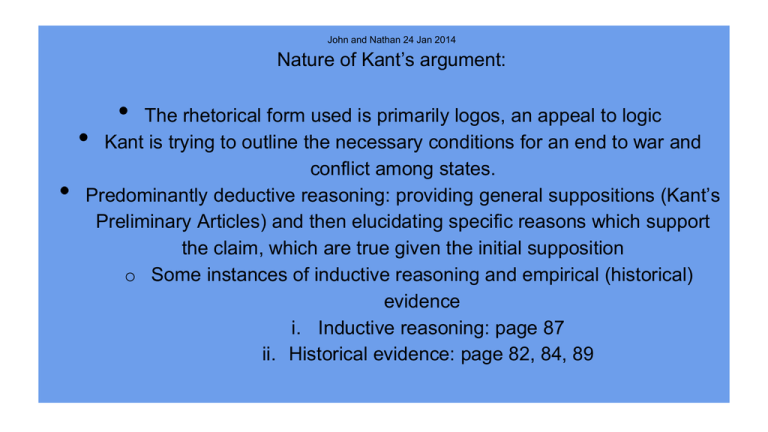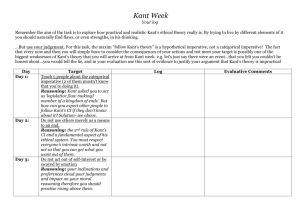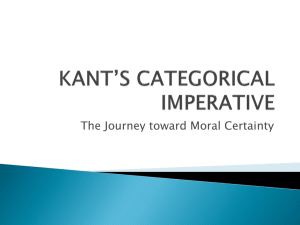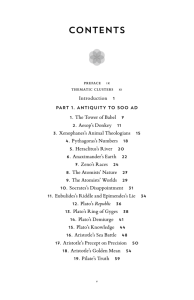x - Willamette University
advertisement

John and Nathan 24 Jan 2014 Nature of Kant’s argument: The rhetorical form used is primarily logos, an appeal to logic Kant is trying to outline the necessary conditions for an end to war and conflict among states. Predominantly deductive reasoning: providing general suppositions (Kant’s Preliminary Articles) and then elucidating specific reasons which support the claim, which are true given the initial supposition o Some instances of inductive reasoning and empirical (historical) evidence i. Inductive reasoning: page 87 ii. Historical evidence: page 82, 84, 89 • • • Kant’s target “audience”: • The work is addressed to politicians that had engaged • in the exact behavior Kant says to avoid. his o (secret treaties in the Treaty of Basil 1795) o Several sarcastic references to the “practical politician” both in the introductory paragraphs and the secret supplement at the end. Challenges Absolutism, Monarchy, and intense Nationalism. Kant outlines six necessary laws/rules/preconditions that nations must abide by in order for his proposed system to bring perpetual peace. These are “The Preliminary Articles”. I.‘‘No peace settlement which secretly reserves issues for a future war shall be considered valid.’’ II.‘‘No independently existing state (irrespective of whether it is large or small) shall be able to be acquired by another state through inheritance, exchange, purchase, or gift.’’ III.‘‘Standing armies (miles perpetuus) shall gradually be abolished entirely.’’ IV.‘‘The state shall not contract debts in connection with its foreign affairs.’’ V.‘‘No state shall forcibly interfere in the constitution and government of another state.’’ VI. “No state shall allow itself such hostilities in wartime as would make mutual trust in a future period of peace impossible. Such acts would include the employment of assassins (percussores), poisoners (venefici), breach of surrender, incitement of treason (perduellio) within the enemy state, etc.’’ • • The preliminary articles are necessary rules which must be followed in this proposed international realm but Kant chooses to separate them from the fundamental structural changes that he outlines in “The Definitive Articles” 1. “The Civil constitution of every state shall be republican” Kant claims that all governments must be a republic in their governance, not a democracy o Kant does not provide many specifics for how the republic ought to be laid out other than stipulating that members must be equal as citizens, free to act, and bound by a common legislation. o Also stipulates that the executive and legislative branches must be kept separate. Logical choice because republics are naturally conducive to the aim of perpetual peace: a scenario in which the people are their own state rulers would naturally engender perpetual peace as people would certainly not want to engage themselves in war if they have a say in it, whereas under a government where the people are subjects, they have no say against a declaration of war. 2. “International right shall be based on the federalism of free states” States coexist in a federative union, which Kant calls a “pacific federation” for the purpose of “securing and maintaining the freedom of a state for itself and also the freedom of other confederated states without...being required to subject themselves to public laws.” 3. “Cosmopolitan right shall be limited to the conditions of universal hospitality” "the right of a stranger not to be treated in a hostile manner by another upon his arrival on the other’s territory”82 Kant argues that relations between nations and individuals must be distinct because people can now be considered “citizens of a universal state of human beings” who possess “rights of citizens of the world”83 • • • • • • • • • i. Human nature: what theory is developed, what assumptions are made? He speaks about human nature and ego with respect to politicians. o In the Second Supplement which he titles the Secret Supplement, he speaks to the nature of politicians ego’s and therefore sanctions closed door meetings in order to negotiate privately and without fear of reproach. When addressing the need for a Cosmopolitan Right o “The maliciousness of human nature, although quite concealed by the coercion of government in the state of civil law, can be observed openly in the free relations between the peoples”82 ii. Ethics: how do ethics figure in the argument? Is the author engaging in moral condemnation or moral prescription, if so, on the basis of what sort of ethical theory? Kant does not use or try to justify any specific moral principles, rather he tries to outline the practical conditions for peace. o Morality is the “theoretical doctrine of right” (94) iii. Politics: what is politics according to the author? What should the purposes of politics be? Politics is the “applied doctrine of right” (94) Politics is the interactions of multiple representative governments. Evaluation of Kant’s Claim Strengths: 1. Hard theory to negate because it is virtually impossible to apply in practice. 2. Binding international law could resolve conflicts. • • Weaknesses: Kant makes multiple assumptions that are not necessarily true, but much of his reasoning is derived by holding these suppositions as valid o All humans will act rationally in a republic, or else that they will invariably pursue their own interests (against war) o All republics will function perfectly as he describes them Very unclear how the republic is supposed to be formed. Disarmament, especially nowadays, is essentially impossible. • • •







